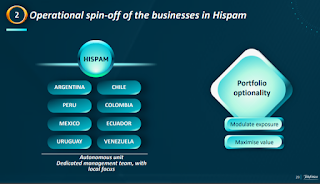Warning that its current telco business is "close to being exhausted," Telefónica announced a major restructuring that will see it divest from most of its markets in Latin America and refocus on its key European operations.
José María Álvarez-Pallete, Chairman & CEO of Telefónica, states: "At Telefónica, we have the mission of imagining the company we want to have for the future. It is up to us to design a company for the next 100 years. An ambitious, responsible and sustainable company, full of opportunities. A company that can face a revolution that provides so many opportunities and raises uncertainties. It is up to us to envision it, design it and build it, as others have done before us."
Telefónica Board approved 5 decisions to reshape the company:
Telefónica's 3Q19 revenues by geography
José María Álvarez-Pallete, Chairman & CEO of Telefónica, states: "At Telefónica, we have the mission of imagining the company we want to have for the future. It is up to us to design a company for the next 100 years. An ambitious, responsible and sustainable company, full of opportunities. A company that can face a revolution that provides so many opportunities and raises uncertainties. It is up to us to envision it, design it and build it, as others have done before us."
Telefónica Board approved 5 decisions to reshape the company:
- Prioritise Spain, Brazil, the UK and Germany, as key markets in which Telefónica can provide differential value to its customers and grow in a sustainable manner. Currently, Spain, Brazil, the UK and Germany are Telefónica's main markets.
- Operational spin-off of the businesses in Hispanoamérica. Telefónica cited particular conditions in these markets (macro and regulatory environment, greater competitive pressure, insufficient scale or volatility of currencies). Going forward, Telefónica will adopt a new model for these operations, which will now be managed as an autonomous unit with a dedicated team. The goal is to reduce the company's exposure to the region, while creating the conditions to maximize its value, both via growth, consolidation and potential corporate operations.
- Launch of Telefónica Tech, to boost growth in areas with greater potential. The new Telefónica Tech will serve the B2B segment, focusing on three businesses: cybersecurity, IoT and Big Data, and cloud. Telefónica Tech will integrate the global units currently dedicated to the development and provision of these services, in order to deepen management focus and achieve greater scale.
- Creation of Telefónica Infra, to highlight the value of the company's infrastructure assets and develop alternative models of infrastructure deployment that accelerate growth. The new unit will leverage Telxius, in which Telefónica has a 50.01% stake. Telefónica Infra's ambition is to be one of the largest telecommunications infrastructure units in the world. The management team of this new company will focus on the development and monetization of towers, distributed antenna systems, data centres (including EDGE), greenfield fibre projects and submarine cables, among others.
- Evolving the operating model to increase agility, speed up execution and maximise synergies between all Telefónica units. Telefónica will adapt its corporate centre to the new reality of the company, focusing on all those activities that provide differential value to all the units of the new Telefónica – the operating businesses, Telefónica Tech and Telefónica Infra - eliminating some existing duplications with the structures of the operating businesses and reducing complexity.


Telefónica's 3Q19 revenues by geography
AT&T to provide Telefonica with last mile wireless access in Mexico
AT&T Mexico will provide Telefonica Movistar with capacity in its 3G and 4G access network and any future network technologies nationwide.
 Under the deal, Telefonica Movistar maintains its transport network and all of its platforms, without operational or geographical restrictions to meet the needs of its users and services. Telefonica Movistar will maintain sole control over its operations, including its client portfolio, operations, assets, administration, pricing, rates, billing systems, among others. AT&T will have no visibility or influence on Telefonica Movistar’s operations.
Under the deal, Telefonica Movistar maintains its transport network and all of its platforms, without operational or geographical restrictions to meet the needs of its users and services. Telefonica Movistar will maintain sole control over its operations, including its client portfolio, operations, assets, administration, pricing, rates, billing systems, among others. AT&T will have no visibility or influence on Telefonica Movistar’s operations.
The migration of Telefonica Movistar traffic to the AT&T access network begins immediately and will continue to be implemented gradually.
"Based on our digital transformation, we are confident that this new approach will make us more agile to provide innovative, simple and transparent solutions that guarantee the best service experience to our customers," said Camilo Aya Caro, president and CEO of Telefonica Movistar in Mexico.
https://www.telefonica.com.mx/
 Under the deal, Telefonica Movistar maintains its transport network and all of its platforms, without operational or geographical restrictions to meet the needs of its users and services. Telefonica Movistar will maintain sole control over its operations, including its client portfolio, operations, assets, administration, pricing, rates, billing systems, among others. AT&T will have no visibility or influence on Telefonica Movistar’s operations.
Under the deal, Telefonica Movistar maintains its transport network and all of its platforms, without operational or geographical restrictions to meet the needs of its users and services. Telefonica Movistar will maintain sole control over its operations, including its client portfolio, operations, assets, administration, pricing, rates, billing systems, among others. AT&T will have no visibility or influence on Telefonica Movistar’s operations.The migration of Telefonica Movistar traffic to the AT&T access network begins immediately and will continue to be implemented gradually.
"Based on our digital transformation, we are confident that this new approach will make us more agile to provide innovative, simple and transparent solutions that guarantee the best service experience to our customers," said Camilo Aya Caro, president and CEO of Telefonica Movistar in Mexico.
https://www.telefonica.com.mx/



























